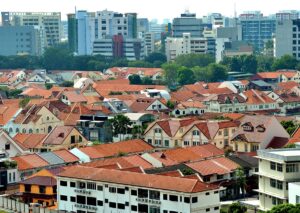COVID-19 has been an unprecedented crisis on all fronts — overwhelming the healthcare system, driving millions into unemployment and severely impacting lives and livelihoods.
On the business front, the pandemic has threatened our global supply chains, disrupted businesses worldwide and crippled the economy.
Given the economic uncertainties that lie ahead, it’s no doubt that the economic recovery from COVID-19 will be a steep and challenging one. Businesses will require all the help they can receive to weather the pandemic and emerge stronger. This is important because the survival of businesses is crucial to the functioning of society.
Support and relief measures in response to COVID-19

When countries were placed under lockdowns, and safety restrictions were imposed to prevent the spread of COVID-19, businesses suffered both weakened demand and disrupted supply. This gravely affected their profits, which caused them to lay off workers to cut costs.
Resultantly, unemployed workers experienced significant income loss and reduced spending power. This led to a decrease in consumer demand. If such a situation persists, it’ll only give rise to a vicious downward spiral, to the detriment of society at large.
To mitigate the effects of the global slowdown, governments across the world have stepped in to offer a helping hand, introducing a slew of measures to aid businesses in riding out the storm. Singapore is no exception.
More financial help for businesses in Singapore
Enterprise Singapore (ESG) has rolled out several business support measures to tide businesses across the various sectors through this difficult period.
These support measures targeted at mitigating costs, providing credit access and regulating cash flows. Relief measures include strengthening of existing financial packages, as well as creating various support initiatives.
On top of tax rebates and levy waivers, the government has also introduced various programmes and grants under Budget 2020.
Some of the initiatives include:
- Jobs Support Scheme
- Temporary Bridging Loan Programme
- Enterprise Financing Scheme
- Loan Insurance Scheme
- Enterprise Development Grant
- Productivity Solutions Grant
Through these schemes, the government seeks to better cushion the negative financial impacts of COVID-19 on businesses.
The schemes also serve to help companies develop their business resilience and maintain their competitiveness amidst this period. Let’s take a look at some of these schemes.
Temporary Bridging Loan Programme
Particularly, local businesses may leverage the Temporary Bridging Loan Programme (TBLP) to their advantage in gaining access to working capital.
Introduced under the Solidarity Budget 2020, the government takes on 90% risk share on loans granted between 8 April 2020 to 31 March 2021, with a maximum loan of $5 million and interest rate capped at 5% p.a.
From 1 April 2021 to 30 September 2021, you can take out a maximum loan of $3 million, with the government taking on only 70% risk share.
The maximum loan tenure is 5 years, of which no principal repayment is required for the first 12 months, but both principal and interest repayment are necessary for the remaining loan tenure.
Enterprises in need of working capital may apply directly to the Participating Financial Institutions (PFIs) for the loan, subject to certain eligibility criteria.
Here’s a table to breakdown the working capital provided for eligible SMEs:
| Applications | 8 April 2020 to 31 March 2021 | 1 April 2021 to 30 September 2021 |
| Maximum loan | $5 million | $3million |
| Government risk share | 90% | 70% |
| Maximum loan tenure | 5 years | 5 years |
| Interest rate | Capped at 5% p.a. | Capped at 5% p.a. |
Enterprise Financing Scheme – SME Working Capital Loan
For enterprises which require additional funds on top of those provided by the TBLP, they may apply for the Enhanced Enterprise Financing Scheme – SME Working Capital Loan (EFS-WCL).
Under this scheme, enterprises can take out a maximum loan of $1 million, subject to certain eligibility criteria.
Both the TBLP and the EFS-WCL are supported by a new facility introduced by the Monetary Authority of Singapore (MAS) — near-zero interest rate loans (0.1 per cent per annum for a two-year tenure).
Navigating the post-COVID-19 world

TBLP and EFS-WCL are but just 2 of the multiple schemes that have been rolled out. A plethora of other business support measures are available to assist companies and employers, all of which aim to poise businesses for recovery.
In addition to applying for financial assistance, what businesses can and should do, in the meantime, is to utilise the current downtime to build up their assets.
After all, COVID-19 has given birth to a new digital-centric era. As companies seek to navigate the post-COVID-19 world, they’ll have to grapple with uncertain market conditions, evolving market trends and changing consumer behaviours.
They must chart a new path for the journey ahead. In preparation, businesses should emphasise the restructuring of their business models, the adoption of digitalisation, and upskilling their workforce.
Otherwise, they may risk getting left behind as a new wave of digitalisation sweeps by.
Read about COVID-19 relief measure extension on home loans here.
If you have any further queries, feel free to contact us for a chat. Here at FinanceGuru, we seek to help you better prepare for your finances and the upcoming milestones in your life. Get a non-obligatory assessment and loan product recommendations here.







